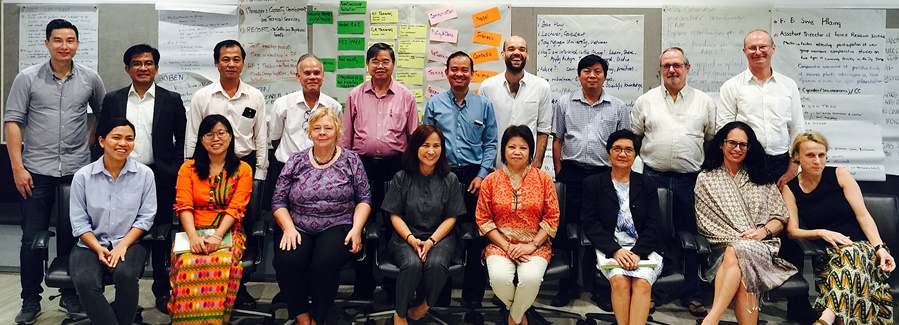The Group brought together experts from ASEAN and beyond to provide critical input to key regional guiding documents
The Mekong Expert Group on Agroforestry for Food and Nutrition Security, Sustainable Agriculture and Land Restoration was formed in early 2018 with support from the Swedish Agriculture Network Initiative (SIANI) to help address major land-use challenges in the ten nations that make up the Association of South-East Asian Nations (ASEAN). The Group from its inception has provided expert advice to the development of a number of major guiding documents that will influence the development of agroforestry in the region of 650 million people.
The SIANI support ended in December 2018 but the Group continues, facilitated in the meantime by World Agroforestry (ICRAF) Southeast Asia.
In most of Southeast Asia, agriculture and forestry are managed separately, which has been shown to exacerbate poverty, food insecurity and marginalization. Agroforestry is increasingly seen as the bridge between the two domains. It was specifically included in the Vision and Strategic Plan for ASEAN Cooperation in Food, Agriculture and Forestry, which states under Strategic Thrust 4: Increase resilience to climate change, natural disasters and other shocks: 4.5 Expand resilient agroforestry systems where ecologically and economically appropriate.
ASEAN has put climate change as a priority, with alignment of forestry, agriculture, food security and climate change seen as critical to fight negative impacts. In particular, ASEAN has recognized the role that agroforestry can play in facing the challenges, both in adaptation and mitigation of climate change. Agroforestry can be effectively deployed on degraded forest land and in restoration and agroforestation of degraded agricultural landscapes to increase carbon stocks and farmers’ resilience and incomes. What is needed is to maximize agroforestry’s economic and environmental benefits in the form of a coordinated approach to reducing barriers to effective policy and widespread implementation.
Against this backdrop, the formation of the Mekong Expert Group was timely in bringing people together, with a focus on Cambodia, Myanmar and Viet Nam owing to those countries’ demonstrated commitment and frequently expressed requests for support, especially with building capacity. The Group’s aim from inception has been to support the wider adoption of agroforestry for food and nutrition security, sustainable agriculture and land restoration in ASEAN Member States.

Members of the Mekong Group on Agroforestry who participated in the inception workshop. Photo: RECOFTC The Center for People and Forests
Impact
Members of the Group have supported the progress of the ASEAN Guidelines for Agroforestry Development, most notably at an inception meeting in Bangkok in January 2018 and at a working conference, Harnessing the Potential of Agroforestry for a Prosperous and Resilient ASEAN, which was organized by Group members in Da Nang, Viet Nam.
The conference preceded the annual meeting of the ASEAN Working Group on Social Forestry and that of the ad hoc steering committee meeting of the ASEAN Multi-Sectoral Framework for Climate Change: Agriculture and Forestry towards Food and Nutrition Security and Achievement of the SDGs (members also participated in both these formal ASEAN meetings). During the conference, members provided their expert input to discussions on implementation of the Guidelines in ASEAN Member States.
The Group was specifically thanked in the Foreword and Acknowledgments of the Guidelines, which were endorsed at the 40th Meeting of the ASEAN Ministers of Agriculture and Forestry in Ha Noi, Viet Nam, 11 October 2018.
The Ministers declared that, “We endorsed the ASEAN Guidelines for Agroforestry Development to promote the role of agroforestry in simultaneously achieving economic, environmental and social outcomes at farm, household and landscape levels and help ASEAN Member States achieve their targets related to food security, sustainable growth, reduction of greenhouse-gas emissions, land restoration, watershed protection, gender equality, social/community forestry, climate-change adaptation and mitigation and, more generally, the Sustainable Development Goals.“
Member States, with support from Mekong Expert Group members, have already begun working on implementation of the Guidelines, particularly, Cambodia and Myanmar, which are establishing ‘road maps’ for agroforestry development.
Based on experience in the two countries, the ASEAN Secretariat has requested a template for such road maps that can be used by Member States to ease the process of agroforestry development. This is also being developed by Group members.
The ASEAN Senior Officials of Forestry commissioned a training of trainers in agroforestry curriculum and an agroforestry practitioners’ field guide, being developed by Group members.
In parallel developments, in Viet Nam, as part of the wider discussion that led up to the Guidelines, the Government established a national working group on agroforestry, focusing on agroforestry’s contributions to the country’s nationally determined contributions to reduce greenhouse-gas emissions under the United Nations Framework Convention on Climate Change. The Philippines has initiated a process to develop a national agroforestry policy or similar guiding document, partly inspired by Mekong Group members. (Originally published by World Agroforestry)
—
Asian Farmers’ Association (AFA), represented by its Secretary General Esther Penunia, is part of the Mekong Expert Group.




Comments are closed